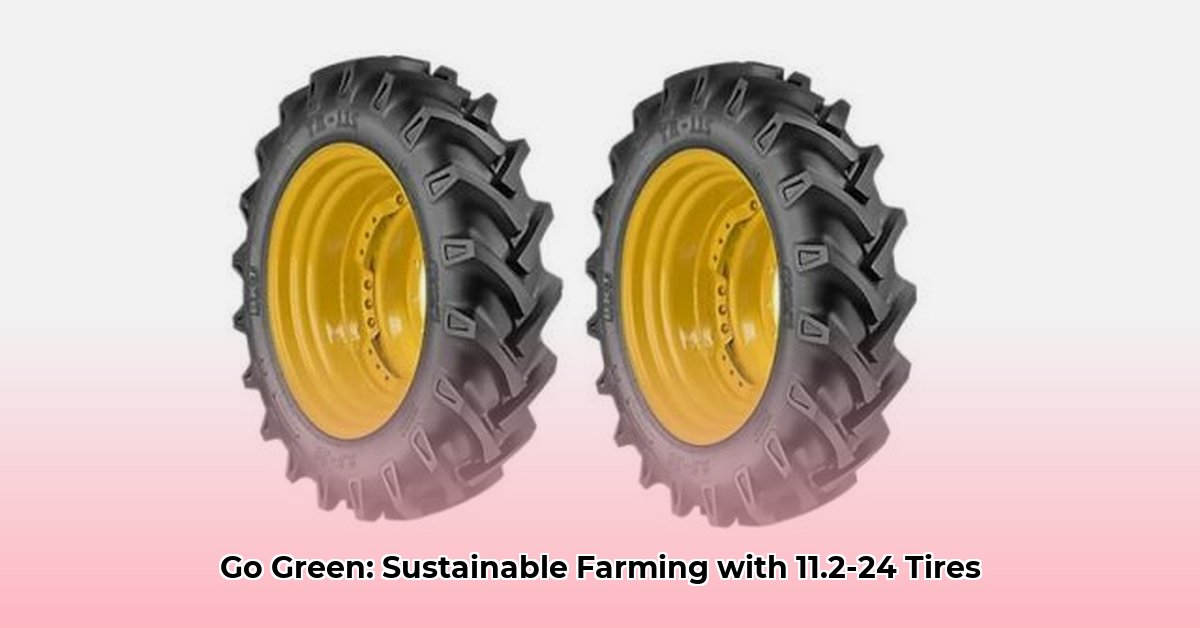
Choosing the right tractor tires significantly impacts both your farm's profitability and its environmental footprint. This guide focuses on 11.2-24 tractor tires, providing actionable steps towards sustainable farming practices. For optimal inflation, explore this tire inflation system.
The Environmental Impact of 11.2-24 Tractor Tires
Manufacturing 11.2-24 tractor tires consumes substantial energy and resources. The production process, from rubber cultivation to manufacturing, contributes to greenhouse gas emissions. However, advancements in sustainable materials and manufacturing techniques are reducing this impact. Furthermore, responsible disposal is crucial. Landfilling contributes to environmental pollution, whereas recycling diverts waste and conserves resources. Isn't it remarkable how choosing the right tire can influence environmental protection?
Economic Considerations: Cost-Effective Tire Management
The financial implications of tire choices are substantial. While new tires offer immediate performance, their initial cost is high. Retreading existing tires provides a cost-effective alternative, extending their lifespan and reducing replacement frequency. This directly translates to lower operational costs over time. But how do we balance initial investment with long-term savings and environmental responsibility?
Performance and Productivity: Optimizing Tire Usage
11.2-24 tractor tires are renowned for their traction, crucial for preventing soil compaction and maximizing yields. Durability is another key factor, as longer-lasting tires reduce downtime and replacement costs. Regular tire inspections, including pressure checks, are vital for optimal performance and extended lifespan. Proper inflation significantly impacts fuel efficiency, further influencing operational costs. How can farmers optimize tire performance to benefit both the bottom line and the environment?
Actionable Steps for Sustainable Tire Management
Implementing these strategies can significantly enhance your farm's sustainability and efficiency:
Tire Selection: Research tires made with sustainable materials and prioritize high fuel efficiency. Consider options that balance cost, durability, and environmental impact. Thorough research will pay off with long-term savings.
Inflation Maintenance: Regularly check and adjust tire pressure to manufacturer specifications. Maintaining proper inflation is crucial for optimal performance and significantly extends tire life, preventing premature wear.
Regular Inspections: Visually inspect tires for cuts, excessive wear, embedded objects, or unusual tread patterns. Addressing minor issues prevents major problems, extending the tire's operational life.
Preventative Maintenance: Rotate tires periodically to ensure even wear. This simple act maximizes tire lifespan and enhances their overall performance.
Responsible Disposal: Explore local recycling options for end-of-life tires. Recycling helps reduce environmental impact and is often a more cost-effective alternative to disposal in landfills.
Comparative Analysis of Tire Options
This table offers a general comparison. Actual costs and lifespans vary based on farming practices, soil conditions, and climate. Note that environmental impacts depend heavily on manufacturing processes and end-of-life management.
| Tire Type | Initial Cost | Expected Lifespan | Fuel Efficiency | Environmental Impact |
|---|---|---|---|---|
| New, Standard | Moderate | Moderate | Moderate | Moderate |
| New, Premium/Specialty | High | High | High | Potentially Lower |
| Retreaded | Low to Moderate | Moderate | Moderate | Lower (potentially) |
| Tires with Recycled Rubber Content | Moderate to High | Moderate to High | Moderate | Significantly Lower |
"The key is to find a balance between short-term costs and long-term sustainability." - Dr. Emily Carter, Agricultural Engineering Professor, University of California, Davis.
The long-term viability of your farm depends on a holistic approach that considers both profitability and environmental responsibility. By making informed decisions about your 11.2-24 tractor tires, you contribute to a more sustainable future for your farm. Continuous innovation in tire manufacturing and improved disposal practices further enhance the potential for environmentally responsible farming.